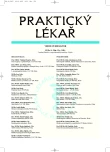-
Medical journals
- Career
Posttraumatic stress disorder (PTSD)
Authors: V. Pidrman
Authors‘ workplace: Přednosta: doc. MUDr. Vladimír Pidrman, Ph. D ; Klinika psychiatrie LF UP a FN Olomouc
Published in: Prakt. Lék. 2007; 87(10): 615-617
Category: Various Specialization
Overview
In a review article the author outlines the up-to-date knowledge of incidence, symptomatology, course, prognosis and treatment of posttraumatic stress disorder (PTSD), that occurs more frequently than it is diagnosed. In up to 80 % of cases it may be associated with a depression. With regard to a latency in days to weeks after a serious traumatic event, an important role in diagnostics falls on traumatologists, and particularly on general practitioners. It is necessary to actively search for symptoms of this disorder which should not be underestimated. Treatment consists in psychotherapy, combined eventually with antidepressant drugs. In the end the author recommends a guideline in ten „keep in mind“ points.
Key words:
posttraumatic stress disorder, acute stress disorder.
Labels
General practitioner for children and adolescents General practitioner for adults
Article was published inGeneral Practitioner

2007 Issue 10-
All articles in this issue
- Diabetes, pre-diabetes and cardiovascular diseases
- Pneumothorax. Overview and current therapeutic options.
- Hemochromatosis – a current review
- Prion diseases in humans
- Urological complications of gynaecologic surgery
- Tumour of the hands
- Regulation of bone cell metabolism at the cellular and molecular level
- Posttraumatic stress disorder (PTSD)
- Initial experience using a laser-balloon endoscopic catheter for the treatment of patients with paroxysmal atrial fibrillation
- Colorectal cancer and inflammatory bowel diseases.
- Progressive heart failure due to cardiac amyloidosis
- General Practitioner
- Journal archive
- Current issue
- Online only
- About the journal
Most read in this issue- Urological complications of gynaecologic surgery
- Pneumothorax. Overview and current therapeutic options.
- Posttraumatic stress disorder (PTSD)
- Hemochromatosis – a current review
Login#ADS_BOTTOM_SCRIPTS#Forgotten passwordEnter the email address that you registered with. We will send you instructions on how to set a new password.
- Career

